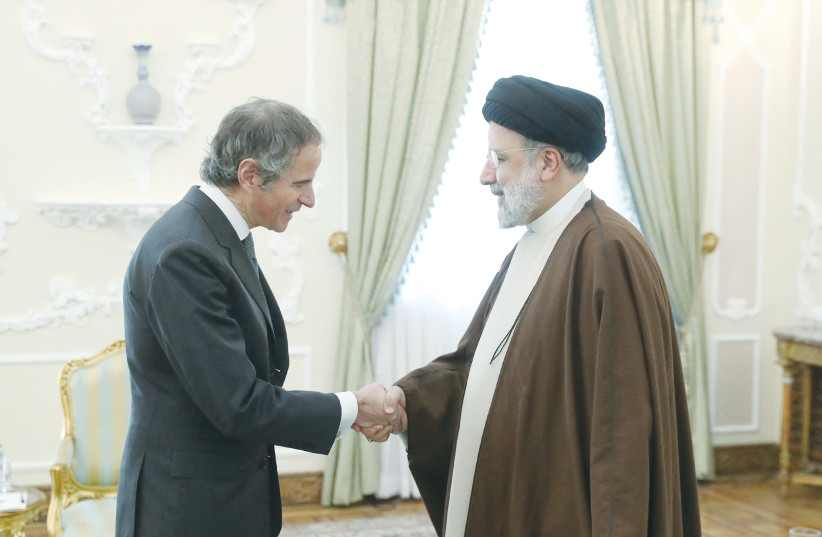Nuclear deal nears, freeing Iranian funds and US prisoners
Further details of an unwritten agreement between the US and Iran regarding Tehran’s nuclear program emerged overnight Wednesday.
The expected deal, which the sides negotiated in recent weeks via Oman after talks to revive the 2015 nuclear agreement failed last year, would have the US provide sanctions relief in exchange for Iran limiting its nuclear program.
Israeli officials warned an agreement was coming for weeks, and many details of the plan have been reported in Israeli media, including The Jerusalem Post. American officials’ willingness to confirm details to reporters at The New York Times and The Wall Street Journal, at a level that they were not willing to do before, for articles released Wednesday may be an indication of the deal’s imminence.
The agreement, entails Iran curbing its uranium enrichment at 60%, far beyond what was permitted in 2015, but below the 90% needed for a nuclear weapon. The US warned in the talks that it would exact a heavy price from Iran if it enriches to 90%.
Iran would also free Americans it is holding in prison
In addition, Iran would no longer sell ballistic missiles to Russia and stop its proxies’ attacks on US contractors in Syria and Iraq, the Times reported.
 IRANIAN PRESIDENT Ebrahim Raisi meets with IAEA Director-General Rafael Grossi in Tehran in March. The writer says US President Joe Biden may grant Raisi an end to all IAEA investigations (credit: Iran’s Presidential Website/West Asia News Agency/Reuters)
IRANIAN PRESIDENT Ebrahim Raisi meets with IAEA Director-General Rafael Grossi in Tehran in March. The writer says US President Joe Biden may grant Raisi an end to all IAEA investigations (credit: Iran’s Presidential Website/West Asia News Agency/Reuters)The US would waive sanctions, specifically allowing Iraq to pay over $10 billion it owes Iran for gas and electricity and for South Korea to pay seven billion dollars for oil imports.
It would not add further sanctions or pursue resolutions against Iran in the UN Security Council or the International Atomic Energy Agency. In addition, the US would agree not to seize foreign tankers bearing Iranian oil, according to the Times.
The US already waived sanctions allowing Iraq to pay Iran $2.76 billion last week. The State Department said that the funds are meant to be used for food and medicine from US-approved sources.
The deal is meant to avoid an escalation and keep the Iranian issue off of the political agenda at least until the 2024 presidential election, Israeli diplomatic sources have posited.
State Department spokesman Matthew Miller has repeatedly denied “rumors about a nuclear deal,” which he called “false or misleading,” but that may be a technicality, in that the understandings with Tehran are meant to remain unwritten and not a formal agreement.
The informality of the deal is likely an attempt by the Biden administration to avoid Congressional review in line with the Iran Nuclear Agreement Review Act (INARA). The law requires the president to notify Congress within five days of any agreement with Iran relating to its nuclear program and transmit any related materials for a 30-day review period. It also requires the president to “determine the agreement in no way compromises the commitment of the United States to Israel’s security, nor its support for Israel’s right to exist.”
Earlier this week, Prime Minister Benjamin Netanyahu told the Knesset Foreign Affairs Committee behind closed doors that the US is determined to reach a “small deal,” and there is little chance Washington will change its mind. All that is left, he said, is for the Islamic Republic to give an answer.
Netanyahu characterized the deal as a “mini-deal” or an “understanding,” rather than a formal agreement that would be put in writing.
“Our stance is clear: No agreement with Iran will oblige Israel,” Netanyahu said ahead of the confidential committee meeting on Tuesday. “Israel will continue to do everything to defend itself.”
Israel’s opposition to the 2015 Iran nuclear deal still stands, Netanyahu said: “We still have different views and we do not hide them, even about small agreements. We make our stance clear, in closed rooms and open ones.”





Comments are closed.